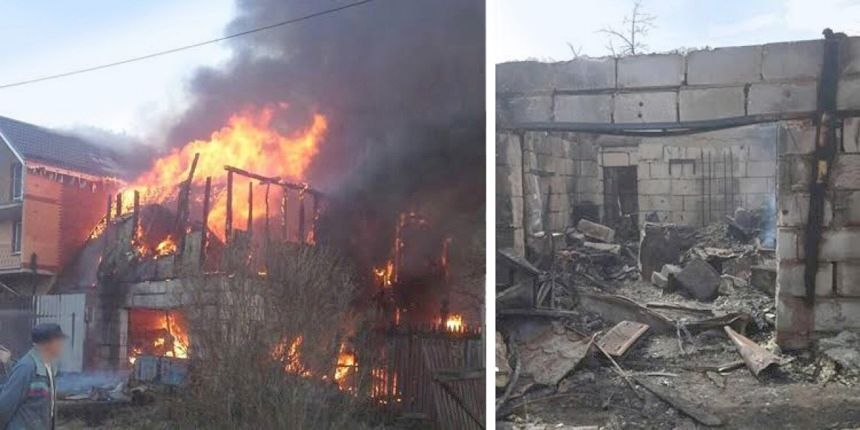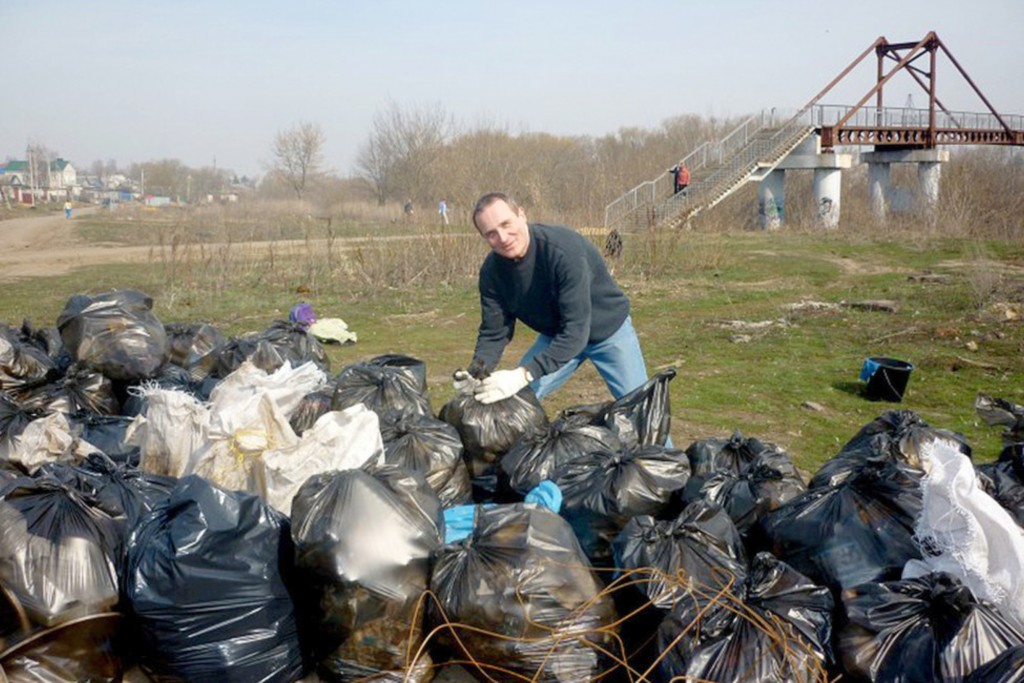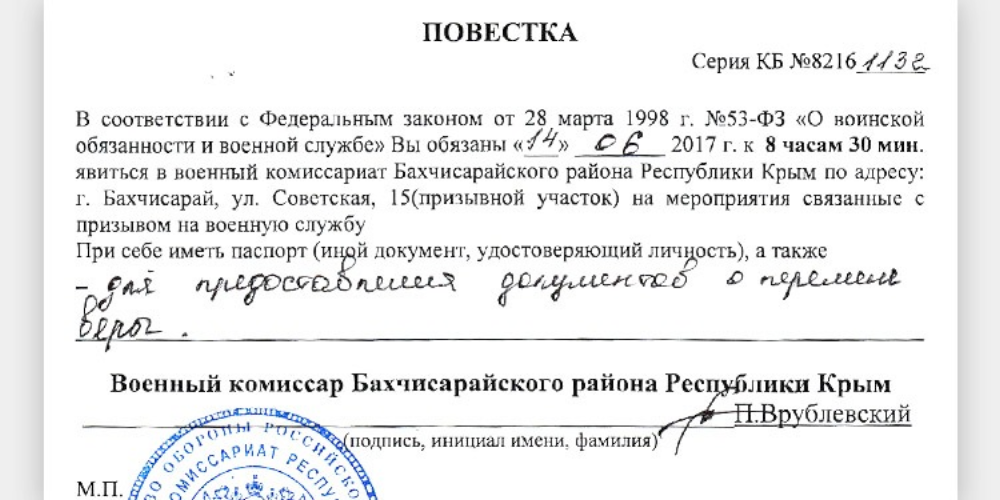On June 9, 2017, a Russian citizen received an official document demanding to renounce his faith and change his religion. It sounds unbelievable, considering the fact that Article 28 of the Constitution of the Russian Federation, adopted at National Voting on December 12, 1993, guarantees to every citizen “the right to profess … any religion or not to profess any” and the 1997 Russian Law on Freedom of Conscience and Religious Associations declares all religions equal before the law and prohibits government interference in religion.
Here are the events that preceded the action:
In April 2017, the Supreme Court of Russia labeled Jehovah’s Witnesses an extremist organization, banned its activities in Russia, and issued an order to confiscate the organization’s assets.
This Supreme Court decision had a severe nationwide impact on Jehovah’s Witnesses. Authorities were violating the Witnesses’ fundamental freedoms and some Russian citizens interpret the decision as a license to discriminate against the Witnesses and even to subject them to hate crimes laws.
According to Wikipedia, Jehovah’s Witnesses is a Christian denomination with beliefs distinct from mainstream Christianity, which “reports a worldwide membership of more than 8.3 million adherents involved in evangelism and an annual Memorial attendance of more than 20 million”.
Controversy surrounds various beliefs and practices of Jehovah’s Witnesses.
Jehovah’s Witnesses refuse blood transfusions. Jehovah’s Witnesses do not work in industries associated with the military, do not serve in the armed services, and refuse national military service, which in some countries may result in their arrest and imprisonment. They do not salute or pledge allegiance to flags or sing national anthems or patriotic songs. They see themselves as a worldwide brotherhood that transcends national boundaries and ethnic loyalties.
In 1933, there were approximately 20,000 Jehovah’s Witnesses in Nazi Germany, of whom about 10,000 were imprisoned. 1,200 of them died, including 250 who were executed.
In Canada during World War II, Jehovah’s Witnesses were interned in camps along with political dissidents and people of Chinese and Japanese descent.
Jehovah’s Witness religious activities are currently banned or restricted in some countries, including China, Vietnam and some Islamic states.
According to Wikipedia, “In the United States, legal challenges by Jehovah’s Witnesses prompted a series of state and federal court rulings that reinforced judicial protections for civil liberties. Among the rights strengthened by Witness court victories in the United States are the protection of religious conduct from federal and state interference, the right to abstain from patriotic rituals and military service, the right of patients to refuse medical treatment, and the right to engage in public discourse. Similar cases in their favor have been heard in Canada.”
In Russia, in spite of guaranties of religious freedom given by the Constitution, Jehovah’s Witnesses have always dealt with opposition. According to Jehovah’s Witness officials, there were 5 incidents of physical attacks on Jehovah’s Witnesses, and 11 incidents of police detention in the first half of 2007. In 2006 there were 24 physical attacks and 40 cases of police detention.
In August, 2010 website of RT (Russian Television) presented some kind of “prediction” :
“Jehovah’s Witnesses, known for their doomsday prophecies, are seen as an extremist cult by the Russian authorities. Banned in many countries, their activities could soon become illegal in Russia as well.
“Since appearing in Russia in the early 1990s, Jehovah’s Witnesses have rapidly gained popularity. The organization says they have 200,000 members in the country, but they could soon be classed as criminals.”
It’s difficult to agree with words “Since appearing in Russia in the early 1990s”.
According to Wikipedia:
“Russian history of Jehovah’s Witnesses started in the end of 19th century”.
There are no official statistics of Jehovah’s Witnesses movement in Russia. Nevertheless it’s widely understood that in 1951, about 9,300 Jehovah’s Witnesses in the Soviet Union were deported to Siberia.
Russian Television doesn’t find odd the idea that 200,000 citizens of their country can be “classed as criminals”.
The European Union condemned the ban of Jehovah’s Witnesses in Russia, noting that the Russian Constitution, international obligations of the country, and international human rights standards guarantee religious groups freedom of assembly without interference.
EU expressed concern that the decision of the Supreme Court of Russia to ban Jehovah’s Witnesses as an extremist organization can launch criminal cases against members of the organization for acts of worship.
The European External Relations Service, which is responsible for the foreign policy of the European Union, stated that Jehovah’s Witnesses should have the right to freedom of assembly.
Since then there have been multiple reports of Jehovah’s Witnesses in Russia being denied this right. Here are just a few of them:
On April 22, 2017 police entered the Witnesses’ house of worship in Dzhankoy, Republic of Crimea, as religious services were concluding. The officers insisted that after the Supreme Court decision, the Witnesses had no right to meet together for worship. They searched the building and then sealed it to prevent its use for religious meetings.
On May 4, the prosecutor’s office issued a warning to the chairman of the Krymsk Local Witnesses’ organization. The warning stated that the chairman and the members of the organization could be subjects to administrative and criminal liability for holding religious services. Since the Supreme Court ruling, at least five other Witnesses’ organizations have received similar warnings.
On May 15, the management of a chemical factory in Dorogobuzh, Smolensk Region, dismissed all of its employees who are Jehovah’s Witnesses. The management explained that they had received an order from FSB to dismiss all of the Witnesses because “extremists” cannot work at the factory.
On May 25, police raided the religious services of the Congregation of Jehovah’s Witnesses of the city of Oryol. The police arrested Dennis Ole Christensen, a 45-year-old native of Copenhagen, a Danish citizen and an elder of the Oryol Congregation. Mr. Christensen is being held in pretrial detention until July 23 while the prosecutor attempts to build a case against him for “extremist activity.” If convicted, Mr. Christensen could be sentenced to a six-to-ten-year prison term.
Christensen became the first Jehovah’s Witness arrested in Russia after the organization was banned by Supreme Court. During the hearing in the Oryol court, the defense of the Dane insisted on the groundlessness of his detention, and asked the court to release him to his family. Several dozens of adherents of Jehovah’s Witnesses and several representatives of the Danish Embassy in Russia came to support the subject of the country.
Mr. Christensen informed the court that “it is very cold and damp” in custody. He has chronic illnesses and was not permitted to use warm clothes. The Dane said: “I need professional treatment, which I can not get here. In addition, here I can take a shower just once a week, and on the remaining days I use water from a bottle. There is no warm water here. And the Bible was taken from me, I think this is unfair”. He concluded his speech with an appeal to Judge Paukov, asking the Judge to release him to his wife, “that we should be together.”
Mr. Christensen is married to a Russian woman and has resided in Oryol for many years, working as a carpenter. He is a law-abiding and respected member of the city’s society. A photo was presented to the court, showing Mr. Christensen’s participation in the volunteers’ weekend cleaning the city streets.
The Judge declined the appeal of the Mr. Christensen. He is still in prison.
On June 9, 2017, even more controversial case, mentioned above, emerged in Crimea.
Russian authorities actively draft young inhabitants of annexed Crimea into Russian army. The Crimean conscription committee demanded from a Jehovah’s Witness draftee a document to renounce his faith and change his religion.
Article 59 of the Constitution of the Russian Federation reads: “A citizen of the Russian Federation in the event his conscientiousness or belief is inconsistent with the performance of military service, as well as in other cases established by federal law, has the right to replace it with an alternative civilian service.”
The Crimean believer was offered an alternative civil service (ACS). He agreed, adding that he has been trying to achieve this for a long time. But then he was told that the right to the ACS would be granted only if he renounces his religious views.
Two summonses requested the draftee “to provide documents on the change of religion.” The believer was not told what faith he should go to, and where to get such documents, but added that if he refused, he would go to court.
Some commentators see the Russian governmental campaign against Jehova’s Witnesses as a part of Russian anti-America campaign. Here is the presented by CNNiReport :
“Russia is systematically banning all religions they consider to be ‘USA’. Jehovah’s Witnesses are only one of the religions being banned on trumped up charges. ANY religion considered to be American is also being persecuted with the help of the Russian Orthodox Church.
“It’s not just Jehovah’s Witnesses that are being persecuted, anyone they consider to be an American religion is a target. Seventh day Adventists, Mormons or any religion the Russian Orthodox deems a threat are targeted.”





I’m so glad that this article shows that other religions other than the Orthodox church are in danger of having this happen to them.